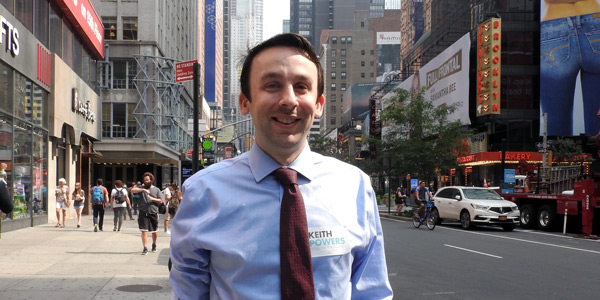By Michael Kuser
NEW YORK — Keith Powers attracted attention in energy circles last month when he wrote an op-ed in Crain’s New York Business advocating that solar panels be floated on the Central Park reservoir.
The park abuts the 4th City Council District — the “Silk Stocking District” — from which Powers is running for a seat. He faces eight rivals in a Democratic primary Sept. 12.
When he spoke to RTO Insider at Times Square early this month, Powers had just been endorsed by the New York League of Conservation Voters, a statewide environmental organization that advocates for clean water, clean air, renewable energy and open space through political action.
“I’ve had very good feedback on my idea to put solar panels in Central Park,” Powers said. “There was a discussion on Mayor Bill de Blasio’s plan, which he calls 80 x 50, to tackle climate change, a very ambitious plan whereby New York City’s greenhouse gas emissions will be 80% lower by 2050 than in 2005. The mayor talks about environmentalism and has big ideas and a plan, so if I’m going to be down at City Hall, I need to be working to make that plan a reality.”
Can New York City on its own create a plan and follow through to reduce its carbon footprint?
“Not only create and follow through,” Powers answers, “but also show the world that a big city can achieve it, can think outside the box, can very realistically help the world tackle climate change.”
Why Floating Solar Panels?
Powers gained government experience working for the State Senate and serving as chief of staff for a member of the State Assembly. Before running for City Council, he was a vice president at Constantinople & Vallone Consulting, a lobbying firm.
He said his point in writing the op-ed piece was to propose something that had not been spoken about so far.
“The district I’m running in includes parts of Times Square, Bryant Park and Museum Mile, all the way up to the Upper East Side, so it truly is the world’s city council district,” he said. “It’s important that the person representing it thinks bigger than just local politics. New York City on its own can be both a global leader on particular issues, but also can solve certain issues just based on the density of the population.”
Solar panels would not detract from the recreational role of the reservoir in Central Park, while their presence would send a powerful signal on the city’s commitment to renewable energy, Powers said.
California is also considering floating solar panels on reservoirs because, aside from the power generation, they also decrease water loss through evaporation and prevent the kind of algae blooms currently afflicting the Central Park reservoir. The cooling effect of the water also increases the efficiency of the panels.
Steal My Idea
“We haven’t seen floating solar in New York yet, but at this moment, when we have a federal government that’s not looking to tackle climate change — in fact doing the opposite — we have cities that are trying to do that work on their own,” Powers said. “We have a very uncertain future in terms of the planet we live on, so not to put all ideas forward would be a missed opportunity.”
Powers wants people to visit New York City and say “our city should be doing that.”
“Philadelphia has a website that features what’s going on in other cities and it’s titled ‘Ideas We Should Steal’ — and I wanted this to be an idea other people would want to steal,” he said. “And many of the ideas featured on that website are from New York City. We learn from each other. I learned of floating solar because I saw that China was doing it. Ideas adapt and migrate, just like birds.”
A lifetime resident of the city, Powers looks to young people to bring about change over the long term — especially to public schools to equip youth with the tools to generate ideas.
“One in 300 Americans are in the New York City public school system, and solving issues like poverty or creating a cure for the next disease can come directly out of our schools,” Powers said. “When we talk about environmental issues, there’s no better way than schools for getting both our students and our city better equipped to deal with the future in terms of climate change.”
Better Buildings
Powers noted that his district has some of the poorest air quality in the city, mainly because its buildings are big polluters.
“We don’t think of buildings that way; we think of vehicles and factories, but our worst polluters in this city are the buildings that we live in,” Powers said. “With new development, we have an opportunity to change the standards and make them more eco-friendly. But with our aging infrastructure, many of the buildings are polluters, so we have bad air quality in Manhattan, period, and my district ranks badly because we’re so dense and have so many big buildings. A lot of the new office buildings are LEED-certified and very progressive in terms of their standards, but old residential buildings keep burning that dirty fuel oil.”
Changing human behavior is the most difficult part, he said.
“We can build nice buildings with the newest technology, but we still have to change human perceptions of what is right,” Powers said. “There is social pressure, the ‘do-good factor.’ And I think it’s great if a company thinks it can win public favor by being a better corporate citizen. But we all go home somewhere every day, and I think a lot of homes are still five to 10 years away from the technology that can really make them energy efficient.”





